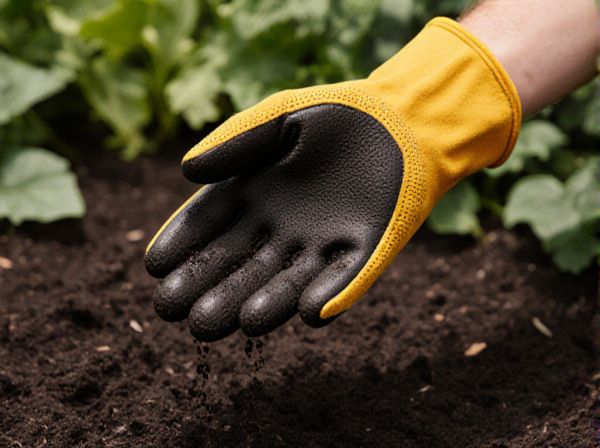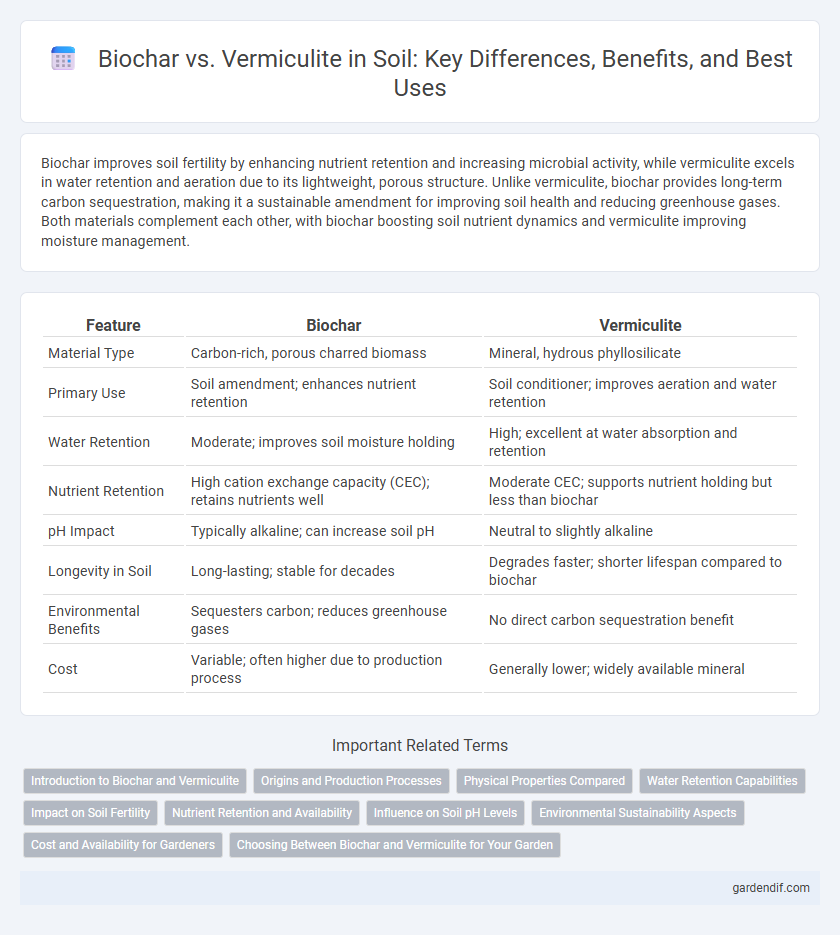
Biochar vs Vermiculite Illustration
Biochar improves soil fertility by enhancing nutrient retention and increasing microbial activity, while vermiculite excels in water retention and aeration due to its lightweight, porous structure. Unlike vermiculite, biochar provides long-term carbon sequestration, making it a sustainable amendment for improving soil health and reducing greenhouse gases. Both materials complement each other, with biochar boosting soil nutrient dynamics and vermiculite improving moisture management.
Table of Comparison
| Feature | Biochar | Vermiculite |
|---|---|---|
| Material Type | Carbon-rich, porous charred biomass | Mineral, hydrous phyllosilicate |
| Primary Use | Soil amendment; enhances nutrient retention | Soil conditioner; improves aeration and water retention |
| Water Retention | Moderate; improves soil moisture holding | High; excellent at water absorption and retention |
| Nutrient Retention | High cation exchange capacity (CEC); retains nutrients well | Moderate CEC; supports nutrient holding but less than biochar |
| pH Impact | Typically alkaline; can increase soil pH | Neutral to slightly alkaline |
| Longevity in Soil | Long-lasting; stable for decades | Degrades faster; shorter lifespan compared to biochar |
| Environmental Benefits | Sequesters carbon; reduces greenhouse gases | No direct carbon sequestration benefit |
| Cost | Variable; often higher due to production process | Generally lower; widely available mineral |
Introduction to Biochar and Vermiculite
Biochar is a carbon-rich material produced through the pyrolysis of organic biomass, enhancing soil fertility and water retention by increasing nutrient availability and microbial activity. Vermiculite is a naturally occurring mineral known for its high porosity and moisture retention, commonly used to improve soil aeration and water-holding capacity in horticulture. Both biochar and vermiculite play crucial roles in sustainable soil management by improving soil structure and promoting plant growth.
Origins and Production Processes
Biochar is produced through the pyrolysis of organic materials like wood, crop residues, or manure in a low-oxygen environment, resulting in a carbon-rich, porous substance known for enhancing soil fertility and carbon sequestration. Vermiculite originates from the natural alteration of mica minerals through heating and exfoliation, creating lightweight, absorbent mineral flakes used to improve soil aeration and moisture retention. The distinct production methods--thermal decomposition for biochar and mineral exfoliation for vermiculite--directly influence their structural properties and soil amendment capabilities.
Physical Properties Compared
Biochar exhibits a highly porous structure with a large surface area that enhances soil aeration and water retention, while vermiculite is characterized by its lightweight, flaky texture that expands when heated, improving soil aeration and moisture retention but with less porosity than biochar. The bulk density of biochar varies but generally remains lower, contributing to better soil structure, whereas vermiculite's consistent exfoliated particles result in stable soil aeration and nutrient holding capacity. Both amendments improve soil physical properties, but biochar's stability and carbon content offer long-term benefits compared to vermiculite's immediate but less durable effects.
Water Retention Capabilities
Biochar enhances soil water retention by improving porosity and increasing moisture-holding capacity, particularly in sandy soils where water drains quickly. Vermiculite absorbs and holds water effectively due to its layered, absorbent mineral structure, releasing moisture gradually to plant roots. Comparing both, biochar contributes to long-term water retention and soil health, while vermiculite provides immediate moisture availability, making each suitable for different irrigation needs.
Impact on Soil Fertility
Biochar enhances soil fertility by increasing nutrient retention, improving soil structure, and promoting microbial activity essential for nutrient cycling. Vermiculite boosts soil fertility by retaining moisture and providing essential minerals like magnesium and potassium, which support plant growth. Together, biochar's carbon-rich composition and vermiculite's mineral properties optimize soil nutrient availability and moisture balance for improved crop yields.
Nutrient Retention and Availability
Biochar enhances nutrient retention by increasing soil cation exchange capacity and improving microbial activity, which promotes the gradual release of nutrients. Vermiculite excels at nutrient availability due to its high water-holding capacity and ability to store and exchange essential nutrients like potassium, calcium, and magnesium. Combining biochar and vermiculite can optimize soil fertility by balancing long-term nutrient retention with immediate nutrient accessibility for plants.
Influence on Soil pH Levels
Biochar typically raises soil pH by adding alkaline properties, making it especially beneficial for acidic soils in improving nutrient availability. Vermiculite has a neutral to slightly alkaline pH and generally has minimal impact on soil acidity or alkalinity. Understanding the differing effects of biochar and vermiculite on soil pH helps optimize soil management for specific crop requirements.
Environmental Sustainability Aspects
Biochar enhances soil carbon sequestration by locking carbon in a stable form, reducing greenhouse gas emissions, and improving soil fertility through increased microbial activity. Vermiculite, while beneficial for moisture retention and aeration, does not contribute significantly to carbon storage or reduction of soil-borne pollutants. Biochar's production from biomass waste supports circular economy principles, making it a more sustainable option in environmental soil management compared to vermiculite.
Cost and Availability for Gardeners
Biochar offers a cost-effective soil amendment with long-term benefits and is often available through local suppliers or online at competitive prices, making it accessible for budget-conscious gardeners. Vermiculite tends to be more expensive due to its mineral mining process and may have limited availability depending on regional distribution, which could challenge small-scale gardeners. Evaluating the cost per application and supply sources helps gardeners choose the ideal substrate for soil improvement.
Choosing Between Biochar and Vermiculite for Your Garden
Biochar improves soil structure by enhancing water retention, nutrient holding capacity, and microbial activity, making it ideal for long-term soil health. Vermiculite excels in aeration and moisture retention, promoting seed germination and root development in container gardening. Selecting between biochar and vermiculite depends on your soil's current condition and plant requirements, with biochar suited for improving poor soils and vermiculite best for moisture-sensitive plants.
Biochar vs Vermiculite Infographic

 gardendif.com
gardendif.com